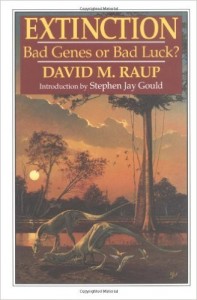
How Much of Evolution is Influenced by Extinction?
I finished reading a wonderful book that I recommend to everyone trying to understand evolution. It was written by paleontologist David M. Raup, who passed away last month. My curiosity was piqued by the Sandwalk blog, which recommended it as one of the top five books on evolution.

Raup argued that given the high rate (99.9%) of species ever living on earth dying out (going extinct), the mode of extinction should play a dominant role in evolution, but what if a large fraction of those extinctions took place due to rare natural catastrophes (such as rocks hitting the earth from sky)? Shouldn’t then the biologists pay less attention to fitness of genes and more to the unpredictable natural events? For a quick introduction to the topic covered, readers may take a look at Raup’s 1994 PNAS paper - “The role of extinction in evolution”.
The extinction of species is not normally considered an important element of neodarwinian theory, in contrast to the opposite phenomenon, speciation. This is surprising in view of the special importance Darwin attached to extinction, and because the number of species extinctions in the history of life is almost the same as the number of originations; present-day biodiversity is the result of a trivial surplus of originations, cumulated over millions of years. For an evolutionary biologist to ignore extinction is probably as foolhardy as for a demographer to ignore mortality. The past decade has seen a resurgence of interest in extinction, yet research on the topic is still at a reconnaissance level, and our present understanding of its role in evolution is weak. Despite uncertainties, extinction probably contains three important elements. (i) For geographically widespread species, extinction is likely only if the killing stress is one so rare as to be beyond the experience of the species, and thus outside the reach of natural selection. (ii) The largest mass extinctions produce major restructuring of the biosphere wherein some successful groups are eliminated, allowing previously minor groups to expand and diversify. (iii) Except for a few cases, there is little evidence that extinction is selective in the positive sense argued by Darwin. It has generally been impossible to predict, before the fact, which species will be victims of an extinction event.